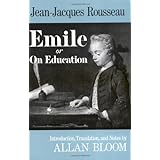
Download the free Kindle app and start reading Kindle books instantly on your smartphone, tablet, or computer - no Kindle device required.
Read instantly on your browser with Kindle for Web.
Using your mobile phone camera - scan the code below and download the Kindle app.

OK
Emile: Or Treatise on Education (Great Books in Philosophy) Paperback – August 1, 2003
- Print length315 pages
- LanguageEnglish
- PublisherPrometheus
- Publication dateAugust 1, 2003
- Dimensions6 x 0.5 x 9 inches
- ISBN-109781591021117
- ISBN-13978-1591021117
- Lexile measure1130L
Books with Buzz
Discover the latest buzz-worthy books, from mysteries and romance to humor and nonfiction. Explore more
Customers who viewed this item also viewed
Editorial Reviews
About the Author
Rousseau's literary career began with his entry in an essay contest in 1749 on the subject of the relationship of science and the arts to morals. His winning essay, Discourses on Sciences and the Arts, soon became the foundation for his later work entitled the Discourse on the Origin of Inequality (1753). With its publication, he became a figure of some controversy in France. Ideological differences between his views and those of his Enlightenment contemporaries soon surfaced, and Rousseau once again found himself alienated from the intellectual establishment.
His differences with the philosophes proved to be the impetus for Rousseau's future work on the content of human nature and man's relationship to society and the state. Contrary to the individualism and intellectual enlightenment advocated by his contemporaries, Rousseau sought to sublimate individuality in the security of the collective personality known as the general will. This new society would be typified by concern for the community and would be ruled by laws developed through a plan of controlled participation. Rousseau's social theory was developed in his work Julie, ou la Nouvelle Heloise (1761) and in Emile (1762). The institutional structure was constructed in The Social Contract (1761).
In Emile, Rousseau presents his utopian vision of child-centered education, full of the sentiments of Romanticism, a movement that Rousseau inspired.
Rousseau's later years were spent fighting off persecution, both real and imaginary. He died near Paris on July 2, 1778.
Product details
- ASIN : 1591021111
- Publisher : Prometheus (August 1, 2003)
- Language : English
- Paperback : 315 pages
- ISBN-10 : 9781591021117
- ISBN-13 : 978-1591021117
- Lexile measure : 1130L
- Item Weight : 16 ounces
- Dimensions : 6 x 0.5 x 9 inches
- Best Sellers Rank: #2,990,208 in Books (See Top 100 in Books)
- #4,237 in Philosophy & Social Aspects of Education
- #5,447 in History of Education
- #13,643 in Literary Criticism & Theory
- Customer Reviews:
About the author

Jean-Jacques Rousseau (/ruːˈsoʊ/; French: [ʒɑ̃ʒak ʁuso]; 28 June 1712 – 2 July 1778) was a Francophone Genevan philosopher, writer, and composer of the 18th century. His political philosophy influenced the Enlightenment in France and across Europe, as well as aspects of the French Revolution and the overall development of modern political and educational thought.
Rousseau's novel Emile, or On Education is a treatise on the education of the whole person for citizenship. His sentimental novel Julie, or the New Heloise was of importance to the development of pre-romanticism and romanticism in fiction. Rousseau's autobiographical writings — his Confessions, which initiated the modern autobiography, and his Reveries of a Solitary Walker — exemplified the late 18th-century movement known as the Age of Sensibility, and featured an increased focus on subjectivity and introspection that later characterized modern writing. His Discourse on Inequality and The Social Contract are cornerstones in modern political and social thought.
During the period of the French Revolution, Rousseau was the most popular of the philosophes among members of the Jacobin Club. Rousseau was interred as a national hero in the Panthéon in Paris, in 1794, 16 years after his death.
Bio from Wikipedia, the free encyclopedia. Photo by Maurice Quentin de La Tour [Public domain], via Wikimedia Commons.
Customer reviews
Customer Reviews, including Product Star Ratings help customers to learn more about the product and decide whether it is the right product for them.
To calculate the overall star rating and percentage breakdown by star, we don’t use a simple average. Instead, our system considers things like how recent a review is and if the reviewer bought the item on Amazon. It also analyzed reviews to verify trustworthiness.
Learn more how customers reviews work on Amazon-
Top reviews
Top reviews from the United States
There was a problem filtering reviews right now. Please try again later.
This must have been abridged to give freshmen elementary education majors a bite size edition to discuss in class for a day or two; as for Rousseau's techniques applied to actual and not theoretical children, I know a two and a half year old who would chew him up and spit him out like creamed cauliflower, long before nap time.






